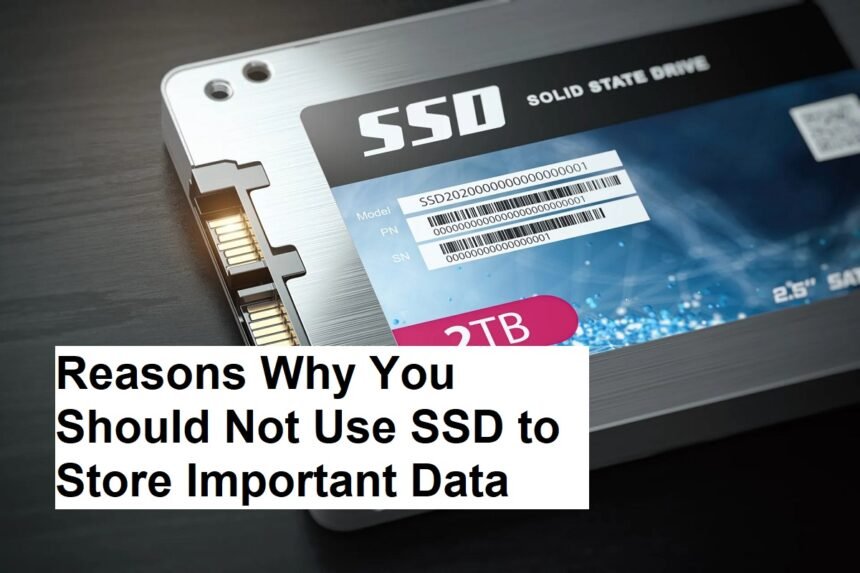Introduction
Solid State Drives (SSDs) have revolutionized the way we store and access data, offering faster speeds, lower power consumption, and more durability compared to traditional Hard Disk Drives (HDDs). Because of these benefits, many users consider SSDs as their primary storage solution. However, when it comes to storing critical and important data—like financial records, legal documents, or irreplaceable personal memories—there are compelling reasons to be cautious about solely relying on SSDs. Here are some key reasons why you might want to avoid using SSDs for important data.
1. Limited Write Cycles and Wear-Leveling Concerns
One of the main technical limitations of SSDs is their finite number of write cycles. Each cell in an SSD can only be written to a certain number of times before it becomes unreliable. Although modern SSDs incorporate wear-leveling algorithms to extend lifespan, over time, significant writing can cause the drive to degrade.
Implication: For data that needs long-term preservation, this wear can pose a risk. Once the SSD reaches its write limit, the data stored on it could become corrupted or inaccessible.
2. Data Retention Issues Over Time
Unlike traditional HDDs or magnetic tapes, SSDs do not store data magnetically; instead, they use flash memory. While SSDs are excellent for speed, data retention can be problematic if the drive remains unpowered for extended periods. Over time, especially in the absence of power, data stored in an SSD can gradually degrade and become unreadable.
Implication: If you are storing important data that doesn’t need frequent access but needs to last years or decades, SSDs might not be the most reliable medium.
3. Susceptibility to Data Corruption and Sudden Failure
Although SSDs are generally more resistant to physical shocks than HDDs, they are not immune to failures. Firmware bugs, power surges, manufacturing defects, or sudden electronic failures can result in data loss. And unlike HDDs, which often show signs of mechanical failure (such as strange noises), SSD failures can be abrupt and complete without warning.
Implication: For critical data, failure can be sudden and catastrophic, sometimes without enough time for proper backup or recovery planning.
4. Higher Cost per Gigabyte for Long-Term Storage
While SSDs deliver excellent performance, their cost per gigabyte tends to be higher than traditional HDDs, especially for large-capacity drives. If you’re storing a vast amount of important data, the expense can quickly add up, making SSDs less economical for long-term storage.
Implication: Budget constraints might force you to choose smaller SSDs or settle for less storage capacity, risking incomplete backups of essential data.
5. Compatibility and Data Migration Challenges
In some cases, particularly with older hardware or systems, SSDs may face compatibility issues or require additional configuration. Moreover, migrating large amounts of data from other storage media to SSDs can be time-consuming and sometimes risky if not properly managed.
Implication: Data migration errors or compatibility issues can threaten the integrity or availability of important data, especially if proper backup procedures are not followed.
6. Lack of Built-in Long-term Data Preservation Features
Traditional magnetic storage technologies, like tapes or archival-grade HDDs, often incorporate features designed for long-term data preservation, such as error correction and stable magnetic storage. In contrast, consumer-grade SSDs prioritize speed and performance over archival stability.
Implication: For data that needs to be preserved securely over decades, SSDs lack specific features that ensure long-term integrity, making other storage media more suitable.
7. Risk of Data Loss Due to Firmware or Controller Failures
Modern SSDs rely heavily on firmware and controllers to manage data writing and reading processes. Firmware bugs or controller failures can cause loss of data on the drive, sometimes making data recovery difficult or impossible.
Implication: Relying solely on SSDs without other backup methods exposes you to the risk of hard-to-recover data corruption or loss due to internal failures.
Conclusion
While SSDs are excellent for speed, responsiveness, and everyday use, they are not the optimal choice for storing important, long-term, or irreplaceable data. Their limited write cycles, data retention issues, susceptibility to sudden failure, and higher costs for large volumes of data make them risky for critical storage needs. To mitigate these risks, it’s advisable to use multiple backup strategies, including traditional HDDs, magnetic tapes, or cloud storage, especially for data that cannot be replaced or recovered easily.
Ultimately, the best approach for safeguarding important data combines different storage methods, regular backups, and careful management—ensuring your valuable information remains secure and accessible for years to come.












